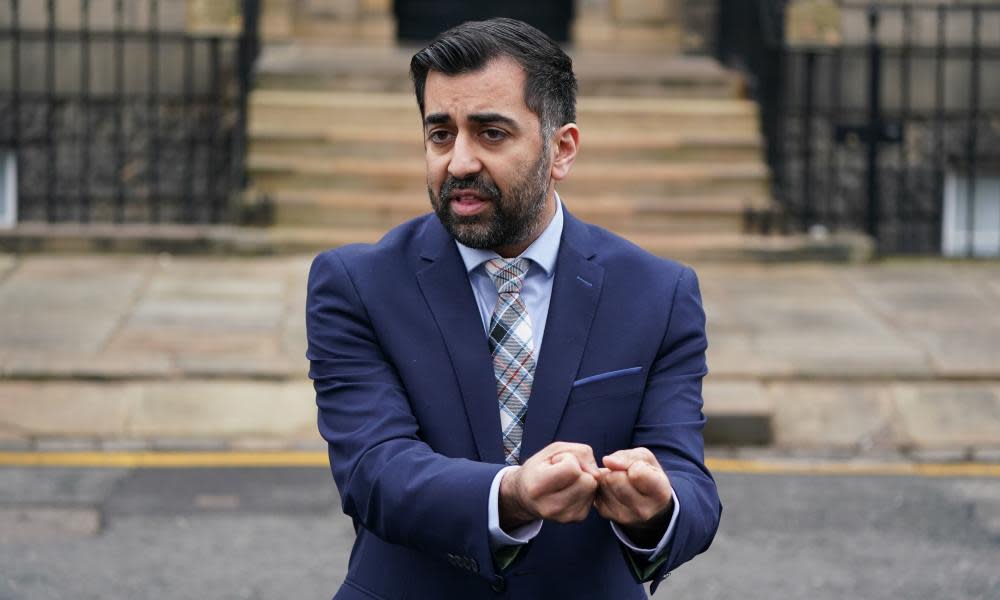Third sector in Scotland calls on Humza Yousaf to swap rhetoric for action

Senior figures across civic Scotland have called on Humza Yousaf to bridge the delivery gap between progressive rhetoric and the reality of policy implementation that they say characterised the Sturgeon era.
Speaking exclusively to the Guardian on and off the record, third sector leaders called for the new first minister to move away from headline-grabbing initiatives towards a systemic approach to policymaking on social justice, equality and poverty eradication.
Urging colleagues across the sector to seize this moment as Yousaf sets out his agenda, they also questioned whether their own closeness to government in recent years had affected their capacity to be critical.
Yousaf needs to wholly review his government’s engagement with the third sector, said Polly Jones, the head of Scotland for the Trussell Trust. “There are many, many working groups and steering groups. We all need to focus on action and not just words,” she said.
Satwat Rehman, the chief executive of One Parent Families Scotland, said: “With a new FM it’s a chance to reset the relationship between civic Scotland and government. We need to be unapologetic in our challenge to the status quo because people’s lives depend on it.”
In particular, she wanted to see the Scottish government using evidence of the impact of particular policies to inform what happens next. “Do we listen to the experiences of families and evidence from the frontline, then use it to change what we do? Perhaps, in some areas, but it needs to become the way business is done across the whole of government.”
Related: The Tories are expecting charities to pick up the pieces of the cost of living crisis | Letters
Previous emphasis on early intervention appeared to have disappeared, she added. “Yes we have been dealing with the pandemic and cost of living crisis response, but we need investment in early intervention now to prevent poverty in first place.”
Peter Kelly, the director of the Poverty Alliance, said: “Too often the rhetoric on social justice does not translate into how the Scottish government organises the economic policy to support those aims.
“The Scottish government’s child poverty agenda has been positive. For example, we’ve seen statutory targets to reduce child poverty, when similar ones were being scrapped in the rest of the UK. Despite this, recent data shows that child poverty figures in Scotland are not much improved over the decade.
“There’s a huge question here about resources. The budget last year stripped away a significant amount from employability funding, but that was a key plank of the child poverty delivery plan.”
As do his third sector colleagues, Kelly recognises limits on the devolved budget, but he said: “There is significant scope with the powers we have.” Yousaf has already flagged his willingness to discuss wealth taxes at a planned anti-poverty summit.
The delivery gap is a “huge focus” for Shelter Scotland, said its director, Alison Watson. “Scotland has the most progressive set of housing rights in the world – on paper – but this has not been met by an equivalent increase in supply of social housing. The result is breaking records over four consecutive years for numbers of children stuck in temporary accommodation.”
The key question for Yousaf’s new cabinet was this, said Watson: “Are they as committed to delivery as they are to political aspiration?”
There is a recognition across the sector that the Sturgeon era was a time of unprecedented access to government for the third sector, with meetings easily secured with cabinet ministers and senior civil servants. This stands in contrast to the UK government, which they feel has largely shut down dialogue with civil society.
But Kelly noted that “opportunities for direct engagement come with a tension, and access does not necessarily mean influence”. “It is essential that having that seat at the table doesn’t stop us being critical,” he said.
Lack of secure or long-term funding also affects an organisation’s capacity to be honest, said Clare MacGilvery, of Making Rights Real.
“The third sector is a hugely creative sector that can do incredible work, but it’s not sustainably funded,” she said. “This means that for organisations getting their funding from the state, either at central government or local authority level, there is a concern that they can’t speak truth to power in case their funding gets cut. Whether that’s a real or perceived concern, it has to change.”
Amid these challenges for the new first minister, there is an equal challenge to each other. “We need to be bold, brave and loud when we hold government to account,” Rehman said.

 Yahoo News
Yahoo News 
